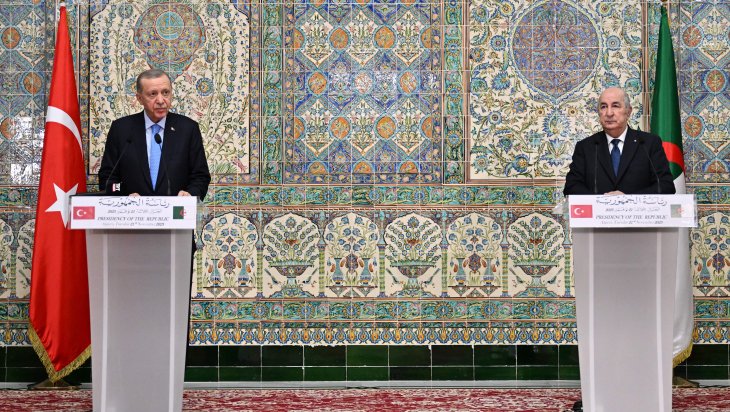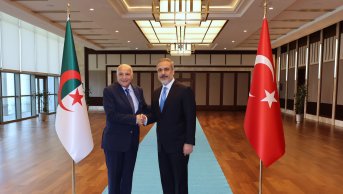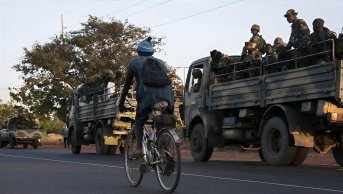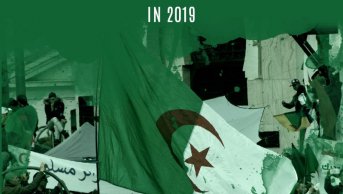Algeria’s and Türkiye’s Relations with the State of Palestine

Chronologically, Algeria put the Palestinian cause in front of its foreign policy principles, supporting people’s right to self-determination. In 1965, it was opened in Algiers’ Victor Hugo Street as the PLO's first office, headed by Ibrahim Khalil al-Wazir, nom de guerre: Abou Jihad, who was assassinated by the Mossad agents in Tunis in 1988.
Active diplomacy for a just cause
The Algeria-Palestine relationship is a unique story between the two countries’ people and leaders because of the long suffering of Algerians from the French colonial authorities’ occupation atrocities. One should remember those immortal pictures from 1974 at the U.N. General Assembly in New York City. PLO chairman Yasser Arafat was invited to the 29th session of the U.N. General Assembly, which was chaired by then Algeria’s Foreign Affairs Minister, Abdelaziz Bouteflika.
In a historic moment, President Houari Boumediènne with PLO chairman Yasser Arafat stood hand in hand on the U.N.G.A podium, followed by a speech by the PLO leader praising Algerian leadership for their full support of the Palestinian cause.
It was a diplomatic victory and an international political shift that enhanced the PLO leader's charisma around the world. No Palestinian official had made a speech at the U.N. since the partition plan in 1947. Later, President Houari Boumediènne’s speech before the U.N.G.A confirmed Algiers’ unconditional support to the PLO, an organization that was considered as a “terrorist” organization by the West, like Hamas and Islamic Jihad movements are nowadays.
The struggle for unity
In June 1988, Algeria held an Arab Leaders Summit called al-Intifadha Summit, led by
President Chadli Bendjedid, in this summit, there was only one issue on the summit’s schedule: supporting the Palestinian first Intifada in Gaza and the entire occupied Palestinian territories. Later in November1988, the Palestinian National Council met in Algiers and announced the declaration of independence, which proclaimed the state of Palestine and al-Qods its capital.
Thus, years past, Algerian President Abdelmadjid Tebboune, in 2022, took the initiative in the internal Palestinian division between Hamas and Fatah that broke in 2007 when Hamas took over the Gaza Strip from Fatah. The meeting of unity between the two rival leaders was organized by President Abdelmadjid Tebboune on the sidelines of the celebrations marking the 60th anniversary of Algeria's independence from France.
Persistence towards just cause
For Algeria, in light of the ongoing geopolitical turmoil that is shaping the entire MENA region and the Maghreb region in particular, itʼs impossible for Algeria now, following the ongoing slaughter taking place in the Gaza Strip on Palestinians, to turn its back on Palestine. Firstly, as a result of all these bold positions towards the Palestinian cause taken by the Algerian authorities, media, elite, and public opinion that have been stated above. Secondly, Algeria is taking a lead in terms of legal actions against Israel’s military and civilian leaders to the International Criminal Court (ICC), diplomatically, shared with Türkiye’s leaders, elite, and public opinion persistence for Palestine.
Historically, Türkiye has had a centuries- long solid cultural bond with the Palestinian people. Türkiye established official relations with the PLO in 1975 and was one of the first countries to recognize the Palestinian State established in exile on November 15, 1988, in Algiers. Türkiye did demonstrate an important relationship with the Palestinian Authority (PA), established in 1996 in the aftermath of the Oslo Accords in 1993; putting in place channels of cooperation focused on improving the living conditions of the Palestinian people in Gaza and the West Bank.
Türkiye, like Algeria, supports the efforts for the recognition of Palestine. In this context, Türkiye actively backed the State of Palestine in its bid for membership to UNESCO in 2011.Furthermore, Palestine’s enhancement of status to a “non-member observer state” at the U.N. in November 2012 by the overwhelming support of the members of the U.N, including Türkiye and Algeria, constituted a landmark in the recognition of Palestine as a state. A proposition was vetoed by former President of the United States, President Barack Obama.
Türkiye on the other hand, has been involved directly or indirectly because of its ties with the Jewish state, Türkiye negotiated a settlement to the Israeli-Palestinian conflict on the basis of U.N. Security Council Resolutions 242, 338, 1397, and 1515, the principle of land for peace and the Arab Peace Initiative that was offered at the Beirut Summit in 2002 to Israel/ This Arab and Muslim Road Map was supported by Türkiye and Algeria alike, according to 1967 United Nations Security Council Resolution 242.
Türkiye like Algeria, cares about Palestinian unity
Türkiye was concerned with the division of the Palestinian political and ideological factions’ leaders, Türkiye encourages national reconciliation like Algeria. Turkish President Recep Tayyip Erdoğan in his state visit to Algeria, did call for Palestinian unity and the end of harsh occupation in Palestine, he said on Tuesday at a joint news conference with his Algerian counterpart Abdelmadjid Tebboune after their meeting in Algiers.
There is wide public support in Türkiye for the Palestinian cause, with pro-Palestine demonstrations drawing thousands of Turks in recent days in large cities. Turkish public opinion is like Algerians, who have been very loud, not in the streets but from the football stadiums’ bleachers.
Türkiye's unique position and policy towards the Palestinian cause
Türkiye, nonetheless, was the first Muslim country to recognize Israel in 1949. Though relations went smoothly until the Davos meeting in 2009 and the so-called bir dakika, bir dakika moment (one minute, one minute), then-Premier Recep Tayyip Erdoğan stormed out of Davos after clashing with Israel’s President Shimon Peres over Gaza massacres.
Since that moment, the two countries’ relations got into a serious impasse, and the situation took a rough turn in 2010. That year, Israel killed nine Turks who were on board a Gaza Freedom Flotilla trying to deliver humanitarian aid to a besieged Gaza Strip, with a tenth dying after years in a coma. Relations were restored in 2016, only to fall apart again in 2018.
Recently, though the two countries did know a quiet “normalization” following the visit of Israel’s president to Türkiye in 2022, to set 14 years of chilly direct diplomatic relations between Türkiye and Israel. Weeks before the al-Aqsa Flood Operation, President Recep Tayyip Erdoğan was willing to receive Israel’s Premier in Ankara, following their meeting last September in the U.N. 78th session.
Yet, the al-Aqsa Flood Operation on October 7 did change the trajectory of the normalization process that the other countries in the region initiated with Türkiye in light of a new dynamic dictated by regional and international geopolitics and economic imperatives: the Ukraine war and the Saudi-Iranian rapprochement that was brokered by China last spring did send a ray of hope of normalization between Türkiye and the UAE, Saudi Arabia, and Egypt — to some extent with Iran to cool off the tensions.
Türkiye is trying to position itself as a trustworthy mediator in the coming peace talks; nonetheless, Ankara’s bold statements following the ongoing ethnic cleansing that is taking place in the Gaza Strip have made this role difficult, but due to Ankara’s mastery of the Palestinian-Israeli conflict dossier, secret diplomacy leaves Ankara to be in fact a real actor with other countries in the region, such as Qatar and Egypt, on this stance.
Whereas, Ankara is still capitalizing on its new foreign policy paradigm: a stabilizing force for peace and security in the region. Ankara’s diplomatic success in moderating between Ukraine and Russia to strike a deal brokered by the U.N Secretary General to export grain to Europe and Africa in 2022 has put Ankara’s in the new balance of power posture in world affairs.
In sum, Ankara, like Algeria, does see Hamas as a liberation movement, and a political party, and not a “terrorist organization,” in this time of crisis, the communication channels are important, seeing the central role of Ankara in playing a major role in the Palestinian-Israeli conflict to breakthrough for a permanent peace. However, fundamental principles are set aside by Israel, where stability and security in the Middle East are becoming catchy semitic lines because of Israel’s seven decades of occupation of Palestinians, annexations of their lands, and, above all, implementing Apartheid policies. As a result, the resistance never stops until justice prevails, which is what Algeria and Türkiye are speaking up for.










